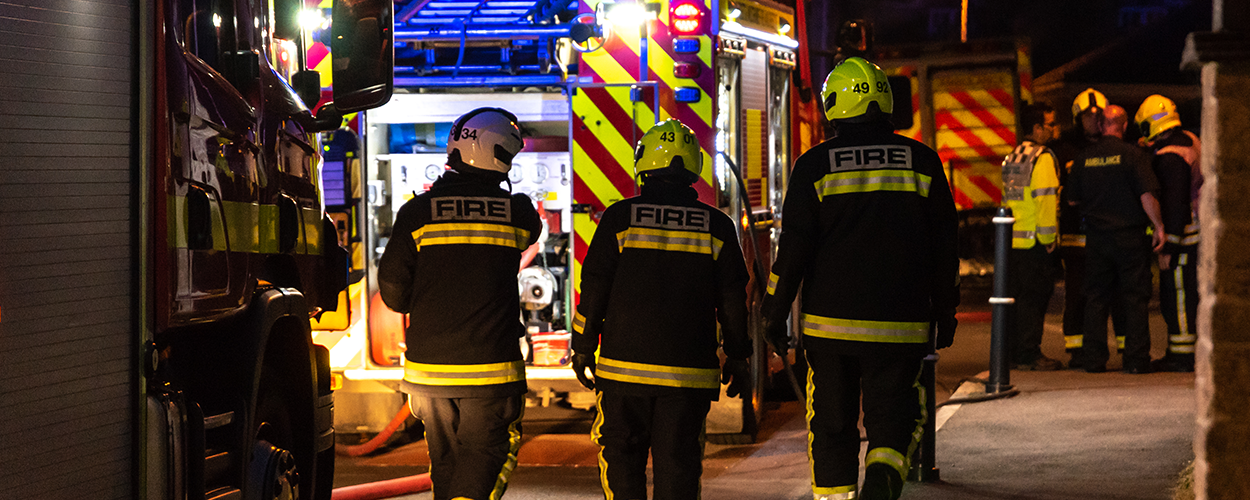Cambridgeshire Fire and Rescue Service
Maximising efficiency with Idox’s Bluelight GMS hosted, managed service
Having a central solution for both organisations held in a cloud environment has really streamlined processes, making the management of files and network restrictions much simpler.
Nicola Smith
Information Manager
CFRS
Background:
Harnessing location accuracy to deliver effective fire and rescue services
Cambridgeshire Fire and Rescue Service (CFRS) delivers lifesaving services to more than 900,000 residents across Cambridgeshire and Peterborough. Its service delivery focuses on three key areas, prevention, protection, and response. To provide an effective and efficient service, it’s critical for all three areas to access the most up-to-date and accurate data available – AddressBase Premium (ABP).
CFRS benefits from using Idox’s Bluelight Gazetteer Management System (GMS) as their central repository for ABP, which provides a single source of truth for the Service’s location data. By matching disparate datasets to the GMS data, it cleans those addresses and allocates the Unique Property Reference Numbers (UPRN) as the unique identifier. With the different datasets now using the UPRNs as the address anchor, the Service can link numerous sources of data to a specific location, providing much richer insights at the click of a button.
Why is this useful?
When the Service’s Control is alerted to an incident, the crew can be briefed on any location-specific intelligence and risks linked to that location via the UPRN, such as a resident’s vulnerability or the presence of dangerous chemicals on a commercial premises. As a result, the safety of both public and staff is maximised through better informed emergency planning and effective evacuation where required.
CFRS has had a lot of success with using ABP via the Bluelight GMS. In fact, based on that success, Bedfordshire Fire and Rescue Service has collaborated with CFRS to help better manage its own location data.
Nonetheless, while its desktop version of Bluelight GMS has proven time and again to be an essential system for address management, we recognise that implementing updates, upgrades, and patches requires resources that emergency services often find challenging to allocate.
Challenge:
Staying on top of updates and upgrades
CFRS has been reaping the advantages of a feature-rich GMS and matching tool enabling the delivery of British Standard 7666 address data across the service since 2013. However, using the desktop version presented resource issues that were proving increasingly difficult to manage. There was the time-consuming task of implementing the six-weekly ABP updates, along with the need to carry out the GMS upgrades and patches. In addition, as they had agreed to manage Bedfordshire FRS’s location data, they needed to make sure this wouldn’t further their resource issues.
At CFRS, updating the gazetteer data was tasked to a different team from the one managing the gazetteer, which meant scheduling those six-weekly updates with colleagues who may well have conflicting priorities. Consequently, they risked a time lag between the release of the ABP updates and the data being imported.
The GMS upgrades and patches were managed by the gazetteer management team, but they still had to coordinate extensively with others. This posed the very same problem – coordinating across teams with different agendas – but it also generated new questions: who were the right people to engage with this? Would they need a specialist security engineer or a network engineer? Did they need passwords, and from whom? So many issues, most of which were caused not by the excellent work of the teams, but by the time constraints they were faced with. While researching ways to overcome their own data and application update issues, it made good business sense to consider the maintenance of Bedfordshire’s location data, alongside their own requirements. However, this only exaggerated the already significant time and resource issues they were faced with.
The migration itself was straight-forward, smooth and on-time. I’d recommend the hosted managed service widely
Nicola Smith
Information Manager
CFRS
Solution:
Saving time and resources with a managed service
The solution to CFRS’s challenges came in the form of the hosted, managed version of the Bluelight GMS. With this iteration, Idox provides a full service to ensure all updates, upgrades, and patches are implemented seamlessly, with no input required from the service. This means both the GMS and the data itself are all kept up to date by Idox.
When the Service migrated to the hosted iteration of the Bluelight GMS, both the gazetteer management team and the external teams they worked with soon found they were saving significant amounts of time. This led to an inevitable domino effect on its other key challenge, namely, managing Bedfordshire FRS’s data. With so much more capacity, and with both fire services’ data hosted in the same Azure environment, CFRS found it far easier to maintain and establish consistency across the two services.
“Having a central solution for both organisations held in a cloud environment has really streamlined processes, making the management of files and network restrictions much simpler,” says Nicola Smith, Information Manager at CFRS.
“The time savings made through the management service have been vast. For Cambridgeshire alone, we save an average of two hours per six-week update cycle – time that is now allocated to core services.”
Maximising the benefits of the UPRNs
Using the hosted and managed Bluelight GMS has brought benefits to the delivery of services. The GMS allows the creation of local-only addresses that do not appear in ABP. By creating them in the British Standard, complete with UPRNs, fire services can quickly and easily recall locations that (a) may be locally known as high-risk areas, and (b) would not come up on an ABP search.
CFRS is in the process of replacing its mobilising system with one that utilises the UPRNs. Once in place, the UPRNs will be ubiquitous across the whole Service. In the meantime, they are used prolifically to link datasets to inform prevention and protection activities, such as understanding the proximity of fire hydrants to high-risk commercial properties. This information informs the number of crews required, i.e., if the nearest hydrant is far from the incident, additional appliances will need to be deployed.
Incorporating the OS’s new Emergency Services Gazetteer
Using Idox’s managed service to provide up-to-date ABP through its centralised GMS has streamlined processes, maximised efficiency, and enriched reporting. CFRS is now considering how best to introduce the additional data from the Ordnance Survey’s new Emergency Services Gazetteer (ESG). Some of the ESG information would previously have been sourced and managed by CFRS, so utilising the ESG will generate yet more resource savings.
Because we’re always looking for new ways to improve our services, Idox is currently developing the Bluelight GMS to enable delivery of the ESG in early 2025. Once available, the GMS will provide ESG data alongside ABP, which will grant the full location offering in the British Standard. With ESG updates occurring every four weeks and ABP every six weeks, the updates will need to be synchronised, driving renewed demands on time and resources. However, Idox’s managed service will eliminate all requirements for data updates and synchronisation by the Service – once again releasing precious time and resources.
“It will be really valuable to bring the additional ESG data into the control room setting, and if the Bluelight GMS can deliver this along with all the updates and ABP synchronisation, this is certainly something we would like to explore,”
comments Nicola.
Outcomes:
Delivering key goals
“Our primary driver was to save on resources and the hosted managed service has certainly delivered against that,” Nicola continues.
“Before we migrated to the hosted managed service, the management of the addressing dataset was split across two digital teams within CFRS. Now we’ve moved to the hosted model, the process has been streamlined so engagement is now only required between my team and Idox.”
While Idox provides advance notice of when upgrades, patches and updates are happening, there is no input required from the fire service – everything updates seamlessly. This not only saves vast amounts of time and effort, the teams from both fire and rescue services also know that whenever they open the application, it is the most up-to-date version with the maximum amount of functionality, providing the most accurate data.
“The migration itself was straight-forward, smooth and on-time. I’d recommend the hosted managed service widely,” concludes Nicola.
If you’re reading this as a representative of an emergency service, contact us to discuss how we can help you maximise resource savings through our Bluelight GMS hosted managed service.






